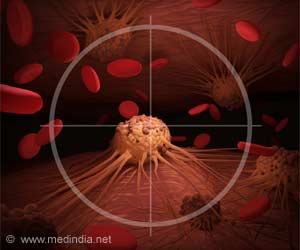Combination cancer therapy significantly reduces breast cancer metastasis and also causes cell death.

‘A combination of APR-246 and helpful antibodies could control tumor development by simultaneously restoring p53 protein function and reducing the tumor blood vessels that supply cancer cells with nutrients.’





In a majority of breast cancer cases, a mutated p53 protein exists. Mutated p53 plays a key role in promoting tumor cells and helps in the development of blood vessels that supply oxygen and other nutrients the tumor needs to grow. However, a specific molecule known as APR-246, which is the drug currently under a human clinical trial, has the ability to restore p53 function giving the body the tools it needs to fight cancer. "In order to effectively treat tumors, therapeutics are being developed that target mutant proteins that help grow cancer cells; APR-246 is one of those drugs," said Salman Hyder, the Zalk Endowed Professor in Tumor Angiogenesis and professor of biomedical sciences in the College of Veterinary Medicine and the Dalton Cardiovascular Research Center. "However, we have identified another way to target cancer cells using APR-246 that attack breast tumor cells as well as antibodies that target the blood vessels that supply nutrients to tumors. Our lab tested whether a combination of APR-246 and helpful antibodies would control tumor development by simultaneously restoring p53 protein function and reducing the tumor blood vessels that supply cancer cells with nutrients." Hyder and his team chose a specific antibody, 2aG4, which has the ability to destroy blood vessels and prevent future growth.
In the human cell lines that were in vitro, or outside the body, researchers saw that APR-246 induced a significant amount of tumor cell death. Then, the team tested the combination therapy with APR-246/2aG4 in mice that had cancerous tumors. Tumor growth was more effectively suppressed by the combination treatment than by either agent alone. In some cases, the therapy completely eliminated cancerous tumors. Additionally, the researchers found that the combination therapy more effectively induced cancer cell death and dramatically reduced the density of blood vessels, which serve as a major route for metastasis.
"APR-246, the drug currently in human clinical trial, is showing very promising results," Hyder said. "Based on our findings, we can show that breast tumor growth might effectively be controlled by simultaneously targeting the p53 protein and the blood vessels that supply cancer cells through a combination therapy."
The early-stage results of this research are promising. If additional studies are successful within the next few years, these compounds may be tested in human clinical trials with the hope of developing new treatments for breast and other cancers.
Advertisement
Advertisement















